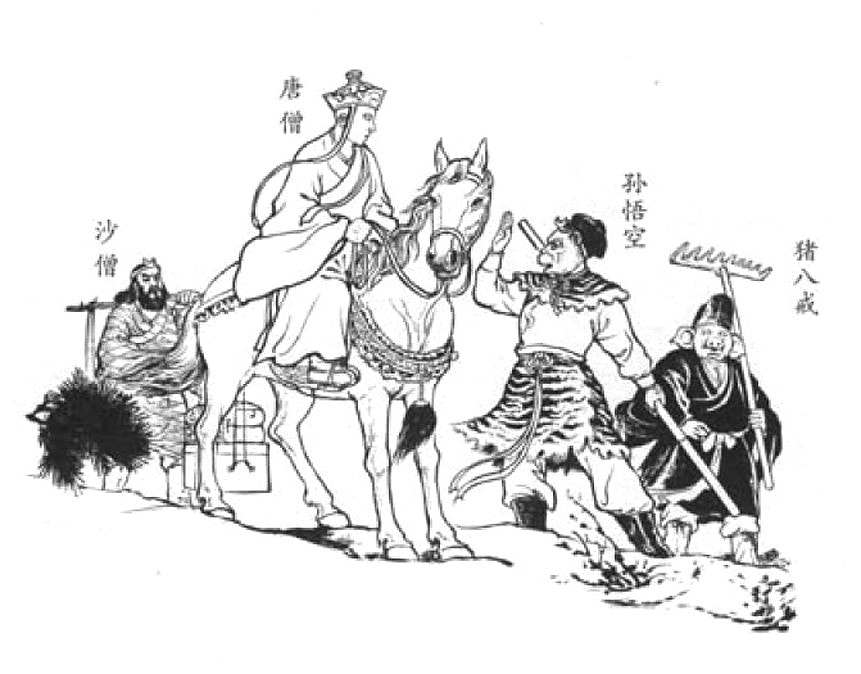Chapter 99 and 100 and THE END
Hello, dear readers. First of all, I have no notes to add to chapter 99 and 100, I hope it’s alright. I think you know all that there is to know to understand them.
I am very happy to have journeyed with you through this book. I don’t know if I have ever read a book this long. Maybe I have, but in another style, not in an episodic style. And I of course, haven’t read a story with so much to learn. I think it’s the beauty of reading a classic from a culture so different from mine. I know some of you were already familiar with JTTW through your family background, but it wasn’t my case, and I don’t regret having started this on Tumblr one random autumn afternoon in 2023 (it’s 2025 now).
Reading Journey to the West over the past year has been such a rewarding experience. It’s not just a novel—it’s a collection of wild, hilarious, and thought-provoking stories that somehow come together into this epic journey. What’s amazing is how fresh and entertaining it still feels, even centuries after it was written. I mean, the characters don’t change much—Monkey’s cleverness, Zhu’s greed, Sha Wujing’s calm loyalty, and Tang Sanzang’s steadfast faith are constant—but it never gets boring. Somehow, that consistency works, and the journey always feels worth it.
Sure, it can be predictable at times—you know they’re going to reach their destination—but that’s the point. It’s about the journey itself, not the end. The adventures, the monsters, the moral dilemmas—it all keeps you hooked, even when you know the general direction the story is heading.
What really stayed with me, though, is how the story reflects on human weakness. The way normal people get overtaken by evil forces or their own failings feels so relatable. And then the pilgrims, especially Monkey, step in to set things right. It’s a bit of a contradiction, though. Buddhism is all about individual responsibility and self-improvement, yet here it often takes divine intervention to solve problems. It’s interesting to think about how that plays out in the story versus the philosophy behind it.
The cultural depth of Journey to the West is incredible, too. It’s not just a fun adventure—it’s a piece of Chinese history and philosophy, filled with commentary on society and spirituality. The way it critiques corrupt leaders and emphasizes the need for ethical responsibility makes it feel surprisingly modern. And the idea of reincarnation isn’t just in the plot—it’s in the story itself, being retold and kept alive for generations.
The beauty of the story is how it balances all these elements: the absurd and the profound, the silly and the serious. It’s a book that can make you laugh one minute and leave you contemplating the nature of impermanence the next.
I feel like after a year and a bit of traveling alongside these characters, it’s clear the journey doesn’t end when you close the book, not to me and not to you.
Write to me on Tumblr about your thoughts.
All my loving,
Wu Cheng’en’s copyist.
If you’re grateful for the bookclub and the sloppy work that I’ve done, I would be really happy if you made a donation to my Paypal. I am unemployed, currently teaching Latin and Spanish online but I earn less than 100€ per month and I haven't been able to get more students.
I decided to study for the public service exams in order to become a public school teacher. The exam is in June 2025 (more or less). In order to prepare myself for these exams, I have to pay for lessons, which are very expensive, and for courses to highlight my candidature. The academy that I am attending will ask of me 1600 euros in total + the courses that I need to take (60€ per course) + books to study. My mother, with whom I live, is a widow, so she can only help me so much financially. At the moment of my posting this, I will have saved 1100 something euros and I need 1700 to pay for the lessons I am taking.
Here's my paypal: https://www.paypal.me/belen9trujillo
Thank you very much for reading, whether you decide to donate or not.


